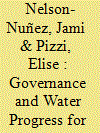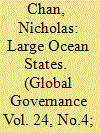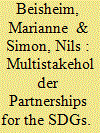| Srl | Item |
| 1 |
ID:
166138


|
|
|
| 2 |
ID:
166144


|
|
|
|
|
| Summary/Abstract |
Little attention has been given to understanding how international courts feature in legitimacy assessments. How should the performance of international courts be evaluated in terms of their effect on a democratic deficit in international lawmaking? This article takes an initial step toward understanding how international courts improve or weaken the presence of democratic values in international lawmaking. In particular, this article focuses on one aspect of international courts—access for transnational actors. This article argues that TNA access to international courts provides an institutional mechanism to advance participation and transparency in international lawmaking. Normative and empirical analysis are combined to illustrate the extent to which access applies to international courts. Based on the empirical findings, which show a marked increase in TNA access to international courts, I argue that the increased participation and transparency made available through TNA access have democratizing effects on international lawmaking.
|
|
|
|
|
|
|
|
|
|
|
|
|
|
|
|
| 3 |
ID:
166143


|
|
|
|
|
| Summary/Abstract |
While the world succeeded in meeting the Millennium Development Goal of halving the number of people without access to improved water sources, many were left behind. As the new Sustainable Development Goals aim to reach universal access by 2030, this article assesses the shortcomings of the MDGs and identifies factors that explain progress for the hardest to reach: the rural poor. The article draws on newly available data on water access by wealth quintiles and finds that rural governance quality is more important for extending water access to the rural poor than to the rich. Government capacity to design and implement policy is particularly important. This article extends the research on inequities in global development progress and the distributive effects of governance quality in development outcomes.
|
|
|
|
|
|
|
|
|
|
|
|
|
|
|
|
| 4 |
ID:
166141


|
|
|
|
|
| Summary/Abstract |
Small island states are typically portrayed as vulnerable and insignificant actors in international affairs. This article traces the emerging self-identification of “large ocean states” that these small island states in the Pacific and Indian Oceans are now employing, juxtaposing their miniscule landmass and populations with the possession of sovereign authority over large swathes of the world’s oceans. Such authority is increasingly being exercised in the context of biodiversity conservation through expanding marine protected areas (an element of both the Sustainable Development Goals and the Aichi Targets of the Convention on Biological Diversity) as an expression of “ecological responsibility.” This new exercise of green sovereignty reinforces state control over spaces previously governed only at a distance, but control made possible only through compromises with nonstate actors to fund, monitor, and govern these MPAs.
|
|
|
|
|
|
|
|
|
|
|
|
|
|
|
|
| 5 |
ID:
166145


|
|
|
|
|
| Summary/Abstract |
Although transparency is frequently employed to enhance the legitimacy of public organizations, several scholars point to its potentially negative implications. This study analyzes the impact of transparency on the authority of peer reviews in international organizations. Authority, here conceived as rooted in legitimacy beliefs, is crucial for peer reviews to produce effects. This research is based on results from an online survey and forty-three interviews with actors involved in two United Nations peer reviews: the Universal Periodic Review in human rights and the Implementation Review Mechanism in the fight against corruption. The article shows that transparency positively affects the perceived development of pressure, yet negatively influences mutual learning and appears to be unable to ensure equal treatment of states.
|
|
|
|
|
|
|
|
|
|
|
|
|
|
|
|
| 6 |
ID:
166137


|
|
|
|
|
| Summary/Abstract |
Based on over seventy interviews with diplomats and experts from all five MIKTA member countries, we find that MIKTA is used as a value-for-money minilateral mechanism for the world’s lesser powers grappling with the heightened global uncertainty and deepening interdependency. MIKTA foreign ministries have used the group as an ad hoc capacity-building and network-sharing scheme; and as a low-cost toolkit to diversify their traditional diplomatic channels and increase global visibility in various multilateral forums. However, MIKTA’s flexible, but precarious, institutional realities also suggest that minilateral arrangements that share MIKTA’s operational characteristics are likely to be short-lived and suffer from weak member commitment, resource constraints, forum-shopping risks, and a leadership vacuum.
|
|
|
|
|
|
|
|
|
|
|
|
|
|
|
|
| 7 |
ID:
166139


|
|
|
|
|
| Summary/Abstract |
In the 2030 Agenda for Sustainable Development, the United Nations assigned an important role to multistakeholder partnerships for implementing the Sustainable Development Goals. Since partnerships show a mixed success record, this article analyzes whether relevant actors in the UN context are inclined to translate lessons learned and the increased knowledge about partnerships’ conditions for success into an improved “UN metagovernance.” Criticizing the current institutional setup, most of the interviewed actors proposed that partnerships should be metagoverned by the UN through systemwide principles, rules, and procedures. There is, however, little consensus as to how that should be done. Drawing on assumptions from the literature and extensive empirical research, the article identifies patterns in actors’ perspectives on the issue.
|
|
|
|
|
|
|
|
|
|
|
|
|
|
|
|
| 8 |
ID:
166142


|
|
|
|
|
| Summary/Abstract |
The theme of the World Bank’s 2006 World Development Report was Equity and Development. This article reviews the origins of the 2006 WDR, and why this was a controversial and political decision. It explains why equity is different from equality. It then considers what the World Bank and other agencies are doing to promote greater equity. Proequity policies require concern about distribution of both wealth and income, and the things that create greater opportunity. These issues are framed in terms of what some economists refer to as the “growth-inequality-poverty triangle.” Resolving some of the contradictions of this triangle—how pro-growth policies and a concern for the distribution of gains does or does not resolve the problem of absolute poverty—explains many of the problems that remain.
|
|
|
|
|
|
|
|
|
|
|
|
|
|
|
|